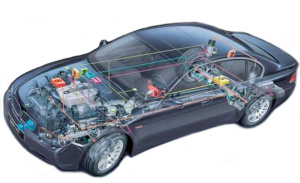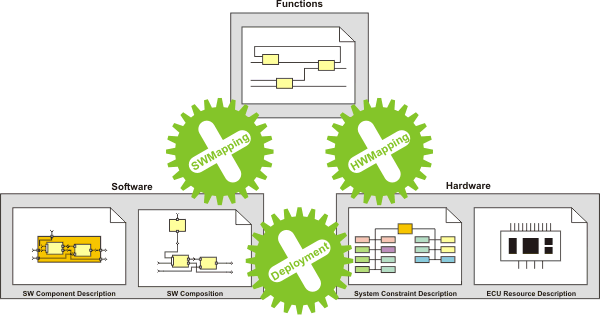|
Navigation
|
i-caramba
 With up to 80 electronic control units in luxury cars, soon 1 GB of software and many non-functional requirements the increasing amount of electronic functionality represents a big challenge for the automotive industry. In today's development processes of embedded systems, numerous models are utilized in parallel to describe one target system. In order to allow a later integration of the different results of this process many consistency relations have to be obeyed.  Networked electronic control units in the BMW 7 series
In an effort to tackle the arising problems in automotive electronics the international AUTOSAR consortium, formed by OEMs, suppliers and tool developers, tries to develop an open standard for automotive E/E-architectures, easing systems integration and deployment of standard components. As one of the most innovative car manufacturers in Germany, BMW Group took over the lead in the consortium and strives for a continuous model-driven development process of automotive electric/electronic systems based on the evolving AUTOSAR standard. In this process architectural models of functions, software and hardware play a prominent role. i-caramba (Integrated Component ARchitecture for Automotive eMBedded Applications) is a cooperative project of BMW Group and the Department of Computer Science 3 (Software Engineering) at Aachen University of Technolgy, which aims at supporting the engineers in developing integrated models of functions, hardware and software by providing concepts and tools. The conceptional work focuses on developing a component meta-model forming the common kernel of the above mentioned models, thus also building the greatest common denominator of all AUTOSAR meta-models. Particular attention is paid to the following aspects:
Tools are developed for editing models separately as well as editors for mappings between models, e.g. the deployment of software components to hardware units. All tools are based on the i-caramba meta-model kernel.  Schematic diagram of the integrated modelling environment
There are many interesting topics for diploma theses available. A project in cooperation with BMW Group, Munich.
 Project leadDipl.-Inform. Christian Fuß Department of Computer Science 3 (Software Engineering) RWTH Aachen Ahornstrasse 55 52074 Aachen Germany Email: cfuss@i3.informatik.rwth-aachen.de Phone: +49 241 80 21322 Fax: +49 241 80 22218 MembersMarita Breuer Mathematical-Technical Assistant, Transformation Rule Editor (PROGRES) Nati Namvong Master thesis (TGGS) "Refactoring function nets extracted from signal lists" Trinh Nguyen Apprentice MaTA (Mathematical-Technical Assistant), Guided Modeling System & Documentation (finished apprenticeship) Verena Tuttlies Diploma thesis (finished) "Extended language features for specifying integration rules" Galina Volkova Mathematical-Technical Assistant, Model Databases (DRAGOS) & GUI Framework (UPGRADE) Robert Wittek Student worker, Diploma Thesis "Benefit of Hierarchical Connectors to Design and Deployment of Automotive Software" Ruben Zimmermann Student worker, GUI implementation & Transformation rule specification Created by: system last modification: Thursday 21 of June, 2007 [11:23:08 UTC] by cfuss |